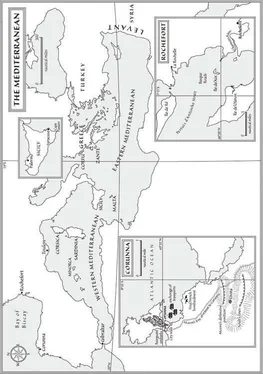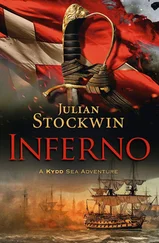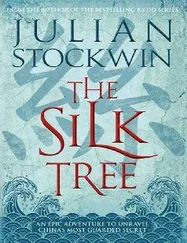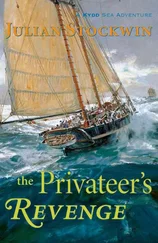Julian Stockwin - The Iberian Flame - Thomas Kydd 20
Здесь есть возможность читать онлайн «Julian Stockwin - The Iberian Flame - Thomas Kydd 20» весь текст электронной книги совершенно бесплатно (целиком полную версию без сокращений). В некоторых случаях можно слушать аудио, скачать через торрент в формате fb2 и присутствует краткое содержание. Год выпуска: 2018, Издательство: Hodder & Stoughton, Жанр: Старинная литература, на английском языке. Описание произведения, (предисловие) а так же отзывы посетителей доступны на портале библиотеки ЛибКат.
- Название:The Iberian Flame: Thomas Kydd 20
- Автор:
- Издательство:Hodder & Stoughton
- Жанр:
- Год:2018
- ISBN:нет данных
- Рейтинг книги:3 / 5. Голосов: 1
-
Избранное:Добавить в избранное
- Отзывы:
-
Ваша оценка:
- 60
- 1
- 2
- 3
- 4
- 5
The Iberian Flame: Thomas Kydd 20: краткое содержание, описание и аннотация
Предлагаем к чтению аннотацию, описание, краткое содержание или предисловие (зависит от того, что написал сам автор книги «The Iberian Flame: Thomas Kydd 20»). Если вы не нашли необходимую информацию о книге — напишите в комментариях, мы постараемся отыскать её.
The Iberian Flame: Thomas Kydd 20 — читать онлайн бесплатно полную книгу (весь текст) целиком
Ниже представлен текст книги, разбитый по страницам. Система сохранения места последней прочитанной страницы, позволяет с удобством читать онлайн бесплатно книгу «The Iberian Flame: Thomas Kydd 20», без необходимости каждый раз заново искать на чём Вы остановились. Поставьте закладку, и сможете в любой момент перейти на страницу, на которой закончили чтение.
Интервал:
Закладка:
‘Because it’s happened, is all.’
‘What?’
‘We’ve made our move. General Moore has upped anchor so to speak and marched off into Spain, lad. Lots of ceremony and such, quantities of the beauty and fashion of Lisbon to see ’em off but they’ve done it.’
‘Do we know how he’s succeeding?’
‘Main well, is most people’s reckoning. Set off eastwards, straight into the Dons’ territory on a compass course for Paris and disappeared from view. Next thing we hear, Madrid is relieved, the French are running like rabbits back to the frontier and all of Spain looks to be free before Christmas, b’God.’
‘A right good crack on the nose for Boney,’ another chimed in, ‘and a gnashing of teeth I wouldn’t wonder, as this puts France itself before a row of cannon mouths and lines of redcoats, which I doubt they’ll relish.’
It was a stunning prospect: could this be a royal road into Bonaparte’s France through which Britain could at last pour men and guns, possibly bring Bonaparte to the peace table and end the war?
‘He’s still got a monstrous navy,’ Kydd mused, finding it difficult to picture Napoleon Bonaparte on the defensive.
‘Which in course he pulls in to defend the homeland,’ Broadwood said.
‘And we’re not talking navy here, we’re talking about soldiery, marching in to finish him. He can’t stop that – his men are all on the run!’
‘So we’re every one out as escorts bringing in more?’
‘Well, not as who’s to say. There’s not so many under arms in England as we can call on, I’ve heard. Never had much to do with big armies, we. My understanding is that Moore’s is the only army of consequence we can muster. Good thing we’re doing so well.’
It seemed the future would be one of supporting the army as it finished the job. Kydd had never really thought about it – the final chapters of the war and how it would all end, for until now Bonaparte’s evil genius had seen them lurch in reaction from one desperate crisis to another, which in truth only the navy had been able to pull the nation through.
At the same time he was uneasy. It was all too quick – but he could see that a vain emperor with conquered territories to hold down, ranging from the distant outposts of Russia nearly to the Atlantic, would have few and thinly spread troops available to deal with an uprising on a nation-wide scale. If Moore was swift he might soon be storming across the frontier. After all, the Spanish must be seeing what he’d achieved and be ready at last to join with him in the driving out of the hated enemy.
The depot had readily replaced Tyger ’s small arms so in a day or so Kydd would be back on the north coast ready for who knew what? All that could be said was that he should be prepared for anything.
‘Another one here, steward. As I think we must raise a glass to General Moore’s health and success, bless him!’
Chapter 64

The town of Vitoria on the Ebro river
Major FitzOwen Inglis eased up the roof tile a little further and, wedging his back against a rafter, trained his telescope carefully on the knot of officers waiting respectfully. He’d been told the identity of the personage who would be arriving by two reliable sources but needed to have it confirmed, for if true it would be a development of catastrophic proportions.
He was hard by the medieval square, and the news that it had been filling with French troops all week had drawn the major from his hideaway in Saragossa.
Inglis was fluent in Spanish through his Galician mother. A careful and intelligent individual, as newly appointed English envoy to the Spanish general José de Palafox y Melci, he’d lost a leg in the chaos of the uprising. While recovering he’d lain low behind the lines and relayed such information as he could garner to the coast for passing on to Wellesley.
He’d seen much, but nothing more pleasing than the streaming thousands of French occupation forces retreating from all parts of Spain. After Bailén they’d abandoned their positions to fall back here, behind the Ebro.
Rumours had been heady and many as to what it meant for Spain, but the British command needed solid facts. Inglis had done his best, but without a network of spies he had to make do with what he could glean from the flow of gossip and his own small but valuable observations.
Shortly, though, he would have in his hands a piece of information that threatened to turn everything on its head.
The French officers were in a tight group, watching the road into town, an array of soldiery in lines to one side of the square, their regimental colours aloft.
Then on the air came the near visceral sound of massed cavalry, and a trumpet baying distantly. It drew nearer, and Inglis focused on the highway where it became visible past the wall of a baker’s shop. Suddenly the first horsemen came into view – and he caught his breath. Yes! An escort detachment of the Imperial Mounted Chasseurs, identified by the golden eagle on their ornate saddlecloths, the shabraques, and their bushy cockades in distinctive bearskins. Their horses steamed in the autumn air from hard riding.
It had to be!
He reached for his crutches and made his way down to the alley, pausing only to check his disguise. He was unshaven, with his still-bandaged leg stump, remnants of a shabby uniform and a battered shako that could have come from any one of the many armies at war in Spain. A bedraggled, wounded soldier, one of so many to be seen these days.
Swinging along as fast as he could, he reached the back of the gawping crowd and made ill-tempered jabs with his crutch until, seeing his condition, they let him through to the front.
The cavalry passed close, with an almost deafening jingle of harness, the faces of the riders hard and ruthless, the gold frogging glinting in the wan autumn sunshine, the stink of their horses rich and heavy on the air.
They proceeded out of sight, only to be displaced by troopers of the Gendarmerie d’élite, tall, perfectly matched, each on a black horse and resplendent with a lofty busby and heavy sabre. Their task was to establish an impenetrable security cordon – for a most important person was increasingly likely to descend from the carriage not far behind.
No less than Napoleon Bonaparte, Emperor of France.
Inglis had heard the legends, the stories of this man who had laid low nearly the entire civilised world single-handed, and he knew, too, all details of how he progressed in military cavalcade with his army about his fiefdom. If this was an impostor sent to awe the Spanish he would be detected, but for now the impressive panoply was convincing.
At last a hush fell on the crowd. The gleaming coach was approaching at a brisk trot, a species of four-in-hand landau with the arms of the Emperor emblazoned on its side.
Inglis squinted. At the reins the driver was wearing a fat turban and flowing silk trousers. That must be Roustam, a Mameluke from Egypt, one of two that went everywhere with the Emperor. And under his seat a capacious box was built into the bodywork, which held Bonaparte’s campaign documents.
The carriage swept around in a half-circle and came to a stop before the group of officers.
Inglis could see them clearly in their finery now, marshals of France all. There was the much admired Soult, boyish and round-faced, confident and erect. Next to him, Ney was ruddy-faced and intense and, hanging back slightly, Lefebvre, a thin, nervous figure, his uniform nearly hidden by decorations. Others, he didn’t recognise.
There was an electric tension in the air. Then the carriage door opened and none other than the Emperor himself was stepping down. Tired, pale and drawn, he stood for a moment in an imperial pose, gravely acknowledging the bows of the marshals, some of whom went to their knees. Then he raised his gaze to the crowd that began an awe-struck chanting, ‘ Vive l’Empereur! ’
Читать дальшеИнтервал:
Закладка:
Похожие книги на «The Iberian Flame: Thomas Kydd 20»
Представляем Вашему вниманию похожие книги на «The Iberian Flame: Thomas Kydd 20» списком для выбора. Мы отобрали схожую по названию и смыслу литературу в надежде предоставить читателям больше вариантов отыскать новые, интересные, ещё непрочитанные произведения.
Обсуждение, отзывы о книге «The Iberian Flame: Thomas Kydd 20» и просто собственные мнения читателей. Оставьте ваши комментарии, напишите, что Вы думаете о произведении, его смысле или главных героях. Укажите что конкретно понравилось, а что нет, и почему Вы так считаете.










